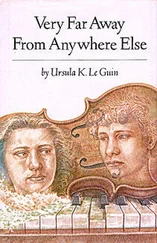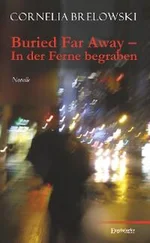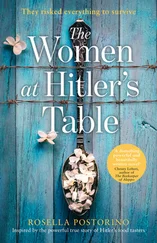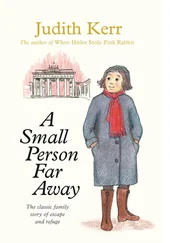“Whatever has he got up to now?” asked Herr Zwirn. He did not like Pumpel who upset his other customers, chewed the furniture and had twice tried to bite Trudi.
“Sometimes he seems to act just like a puppy,” said Omama fondly, though Pumpel was nine years old.
“It’s more like his second childhood,” said Herr Zwirn.
The children searched for him half-heartedly, but it was nearly time to go to school and they were sure that sooner or later he would turn up – probably accompanied by an angry victim whom he had either bitten or whose property he had destroyed. Vreneli came to call for Anna and they set off for school, and Anna promptly forgot all about him. When they returned at lunch-time they were met by Trudi with an air of great importance.
“They found your grandmother’s dog,” she said. “He’s drowned.”
“Nonsense!” said Vreneli. “You’re making it up.”
“I’m not making it up,” said Trudi, outraged. “It’s true – Pa found him in the lake. And I’ve seen him myself and he’s quite dead. One reason I knew he was dead was because he didn’t try to bite me.”
Mama confirmed Trudi’s story. Pumpel had been found at the bottom of a low wall at the edge of the lake. No one ever discovered how he got there – whether he had leapt down in a fit of madness or mistaken one of the large pebbles in the water for a tennis ball. Herr Zwirn suggested that it might have been suicide.
“I’ve heard of dogs doing that,” he said, “when they’re no good to themselves or to anyone else.”
Poor Omama was dreadfully upset. She did not come down to lunch and only appeared, red-eyed and silent, for Pumpel’s funeral in the afternoon. Herr Zwirn dug a little grave for him in a corner of the garden. Omama had wrapped Pumpel up in an old shawl and the children all stood by while she put him in his last resting place. Then, under Omama’s direction, they each threw a shovelful of soil on top of him. Herr Zwirn briskly threw on a whole lot more and then flattened and shaped it into a low mound.
“Now for the decoration,” said Herr Zwirn, and Omama tearfully placed a large plant-pot with a chrysanthemum on top.
Trudi watched her approvingly.
“Now your doggie can’t get out!” she said with obvious satisfaction.
This was too much for Omama and to the children’s embarrassment she burst into tears and had to be led away by Herr Zwirn.
The rest of the day was rather gloomy. Nobody really minded about poor Pumpel except Omama, but they all felt they owed it to her not to look too cheerful. After supper Max went off to do his homework while Anna and Mama kept Omama company.
She had hardly said a word all day, but now she suddenly could not stop talking. On and on she went about Pumpel and all the things he used to do. How could she face travelling back to the South of France without him? He had been such good company on the train. She even had his return ticket – both Mama and Anna had to inspect it. It was all the fault of the Nazis, cried Omama. If Pumpel had not had to leave Germany he would never have drowned in Lake Zurich. That dreadful man Hitler.
After this Mama gradually turned the talk into the usual list of people who had gone to live in different countries or had stayed behind and Anna began to read, but her book was not very interesting and bits of the conversation kept filtering through.
Somebody had got a job in films in England. Somebody else who had been rich was now very hard up in America and his wife had to go out cleaning. A famous professor had been arrested and sent to a concentration camp. (Concentration camp? Then Anna remembered that it was a special prison for people who were against Hitler.) The Nazis had chained him to a dog kennel. What a silly thing to do, thought Anna, as Omama, who seemed to see some connection between this and Pumpel’s death, talked more and more excitedly. The dog kennel was right by the entrance to the concentration camp and every time anyone went in or out the famous professor had to bark. He was given scraps to eat out of a dog dish and was not allowed to touch them with his hands.
Anna suddenly felt sick.
At night the famous professor had to sleep in the dog kennel. The chain was too short for him ever to stand up straight. After two months – two months …! thought Anna – the famous professor had gone mad. He was still chained to the dog kennel and having to bark but he no longer knew what he was doing.
A black wall seemed suddenly to have risen up in front of Anna’s eyes. She could not breathe. She clutched her book in front of her, pretending to read. She wanted not to have heard what Omama had said, to be rid of it, to be sick.
Mama must have sensed something, for there was a sudden silence and Anna could feel Mama looking at her. She stared down fiercely at her book and deliberately turned a page as though absorbed. She did not want Mama and especially Omama to speak to her.
After a moment the conversation started up again. This time Mama was talking rather loudly not about concentration camps but about how cold it had been lately.
“Enjoying your book, dear?” said Omama.
“Yes, thank you,” said Anna and managed to make her voice sound quite normal. As soon as possible she got up and went to bed. She wanted to tell Max what she had heard but could not bring herself to talk about it. It was better not even to think about it.
In future she would try never to think about Germany at all.
The next morning Omama packed her bags. She had no heart to stay the last few days, now that Pumpel was gone. But there was one good thing that came of her visit. Just before she left she handed Anna and Max an envelope. She had written on it, “A present from Pumpel” and when they opened it they found that it contained a little over eleven Swiss francs.
“I want you to use this money in any way that gives you pleasure,” said Omama.
“What is it?” asked Max, overcome by her generosity.
“It’s Pumpel’s return ticket to the South of France,” said Omama with tears in her eyes. “I got it refunded.”
So Anna and Max had enough money after all to go to the fair.
Chapter Eleven 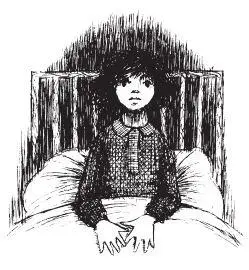
Papa arrived back from Paris on a Sunday, so Anna and Max went to meet him in Zurich with Mama. It was a cool, bright day in early October and as they came back with him on the steamer they could see some new snow on the mountains.
Papa was very cheerful. He had enjoyed being in Paris. Although he had stayed in a scruffy little hotel to save money he had eaten delicious food and drunk lots of good wine. All these things were cheap in France. The editor of the Daily Parisian had been very nice and Papa had also spoken to the editors of several French papers. They too had said that they wanted him to write for them.
“In French?” asked Anna.
“Of course,” said Papa. He had had a French governess when he was small and could speak French as well as he spoke German.
“Are we all going to live in Paris then?” asked Max.
“Mama and I must talk about it first,” said Papa. But he clearly thought that they should.
“How lovely!” said Anna.
“Nothing’s been decided yet,” said Mama. “There may be possibilities in London too.”
“But it’s damp there,” said Anna.
Mama got quite cross. “Nonsense,” she said. “You don’t know anything about it.”
The trouble was that Mama did not speak much French. While Papa had learned French from his French governess Mama had learned English from an English governess. The English governess had been so nice that Mama had always wanted to see the country she came from.
Читать дальше


